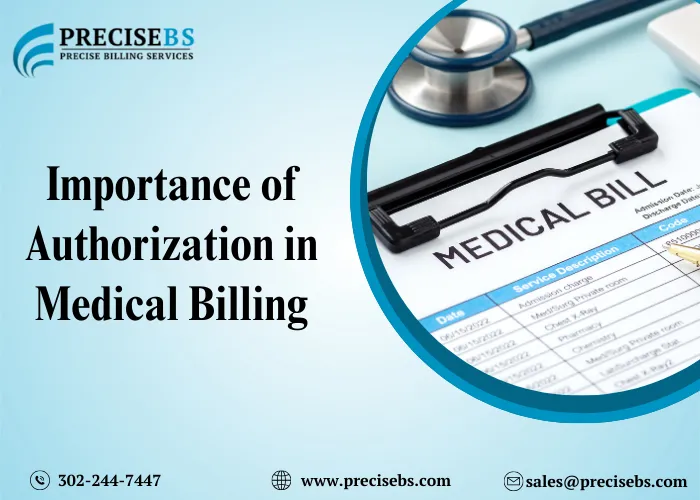Medical billing is a critical component of the healthcare industry, acting as the bridge between healthcare providers, patients, and insurance companies. At the heart of this process lies the concept of authorization, a key element that ensures the smooth processing and payment of medical claims. The significance of authorization in medical billing cannot be overstated, as it directly impacts the financial viability of healthcare providers and the accessibility of care for patients.
Understanding Authorization in Medical Billing
Definition and Basics
In the realm of medical billing, authorization refers to the process of obtaining approval from a health insurance company before performing a service or procedure. This step is crucial to confirm that the proposed medical service is covered under the patient’s insurance plan.
Differentiating Authorization from Verification
While often used interchangeably, authorization and verification are distinct processes. Verification involves confirming a patient’s insurance eligibility and benefits, whereas authorization is specifically about getting approval for certain services or procedures.
Table of Contents
The Role of Authorization in Ensuring Payment
Pre-authorization as a Prerequisite
Pre-authorization is a prerequisite for many non-emergency procedures, ensuring that the services provided are medically necessary and covered under the patient’s plan. This step is pivotal in avoiding claim rejections and denials.
Impact on Revenue Cycle Management
Proper authorization directly influences the efficiency of revenue cycle management. It minimizes the risk of payment delays and denials, thereby maintaining a steady cash flow for healthcare providers.
Authorization and Patient Care
Balancing Financial and Healthcare Needs
The authorization process plays a dual role in balancing the financial aspects of healthcare with patient care needs. It helps in managing costs while ensuring patients receive medically necessary treatments.
Ensuring Timely Access to Care
Decoding authorization can lead to postponed treatments. Efficient authorization processes are, therefore, essential for timely access to medical care, affecting patient satisfaction and outcomes.
Challenges in the Authorization Process
Common Pitfalls
The authorization process is fraught with challenges, including varying insurer requirements, complex policy interpretations, and administrative burdens that can lead to errors and delays.
Navigating Complex Policies
Understanding and navigating the labyrinth of insurance policies is a daunting task for both providers and patients. This complexity often leads to miscommunications and processing errors.
Technology and Authorization Efficiency
Automation in Authorization
The incorporation of automation tools in the authorization process can significantly enhance efficiency, reducing manual errors and expediting approvals.
Benefits of Electronic Health Records (EHRs)
Electronic Health Records (EHRs) play a pivotal role in streamlining authorization by providing quick access to patient records, thereby facilitating faster decision-making.
Legal and Compliance Aspects
Regulatory Framework
Medical billing and authorization must comply with various laws and regulations, including HIPAA and state-specific guidelines, to ensure data privacy and ethical billing practices.
Consequences of Non-Compliance
Non-compliance with legal and regulatory standards can lead to severe consequences, including financial penalties, legal actions, and reputational damage.
Best Practices in Medical Billing Authorization
Streamlining the Authorization Process
Adopting best practices like regular training, clear communication, and efficient workflow management can streamline the authorization process.
Effective Communication Strategies
Effective communication between healthcare providers, insurers, and patients is crucial for a seamless authorization process, reducing misunderstandings and delays.
Case Studies: Success and Failure in Authorization
Analyzing Real-world Scenarios
Case studies of successful and failed authorization processes provide valuable insights into best practices and common pitfalls, offering learning opportunities for healthcare providers.
Future Trends in Authorization
Predictive Analytics
The use of predictive analytics in medical billing can foresee potential authorization issues, allowing for proactive measures to be taken.
Emerging Technologies
Advancements in technology, such as AI and blockchain, promise to revolutionize the authorization process, enhancing accuracy and efficiency.
Patient Education and Involvement
Empowering Patients
Educating and involving patients in the authorization process can enhance their understanding and satisfaction, leading to a more transparent and patient-centric approach.
Transparency in Billing
Transparency in billing and authorization processes is essential for building trust and ensuring patients are well-informed about their financial responsibilities.
Conclusion
Authorization in medical billing is a complex yet indispensable process that ensures the financial sustainability of healthcare providers and the accessibility of care for patients. By understanding its importance, challenges, and best practices, the healthcare industry can work towards more efficient, transparent, and patient-centric billing processes. The future of medical billing authorization looks promising with the advent of new technologies and methodologies, poised to bring significant improvements in the healthcare sector.
Frequently Asked Question
What is the purpose of authorization in medical billing?
Authorization in medical billing is essential for confirming that a proposed medical service is covered under the patient’s insurance plan, ensuring payment for the healthcare provider and avoiding unexpected costs for the patient.
How does authorization impact patient care?
Efficient authorization processes ensure timely access to necessary medical treatments, balancing healthcare needs with financial aspects, and enhancing patient satisfaction and outcomes.
What challenges are associated with the authorization process?
Efficient authorization processes ensure timely access to necessary medical treatments, balancing healthcare needs with financial aspects, and enhancing patient satisfaction and outcomes.
What challenges are associated with the authorization process?
The authorization process faces challenges like varying insurer requirements, complex policy interpretations, administrative burdens, and potential delays, all of which can impact payment and patient care.
How can technology improve the authorization process in medical billing?
Technology, particularly automation tools and Electronic Health Records (EHRs), can enhance the efficiency of the authorization process by reducing manual errors, expediting approvals, and providing quick access to patient records.
Why is patient education important in the authorization process?
Educating patients about the authorization process promotes transparency, helps them understand their financial responsibilities, and enhances overall satisfaction with the healthcare experience.

